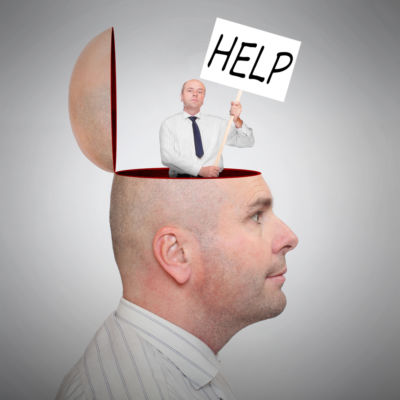One of the most common mainstream symptoms people have latched onto due to media portrayals is that people living with schizophrenia hear voices. This easily becomes conflated with dissociative identity disorder, previously known as multiple personality disorder, in which a person develops distinct and separate identities. People with schizophrenia don’t have multiple personalities, and not everyone hears voices.
In reality, schizophrenia is listed in the Diagnostic and Statistical Manual of Mental Disorders (DSM) as a severe mental illness that’s often terrifying to experience. Schizophrenia symptoms can be categorized as psychotic, positive, negative, or cognitive. Placing yourself in the shoes of someone with schizophrenia would mean experiencing paranoia, fear and delusions that drastically interfere with everyday functionality.
When developing schizophrenia, people usually undergo gradual changes in their mood, thinking and social functioning before their first episode of psychosis. Looking at the lesser-known symptoms of schizophrenia can help individuals understand what this mental health disorder entails, identify early warning signs, and know how to help a loved one access appropriate psychological treatments.
Disorganized Speech and Communication
Disorganized speech and communication are just one of the less-talked-about symptoms of schizophrenia that can be completely debilitating. Disorganized speech involves disconnected or poorly connected chains of ideas that make perfect sense to the speaker, but others cannot follow. This pattern of speech is evidence of a positive thought disorder.
In a review of the current understanding of language in schizophrenia, several examples of disorganized speech are included. Usually, ideas are entirely unrelated or tangentially related, or words are used abnormally. Severe cases may even manifest in an unintelligible speech called word salad.
In contrast, a person with a negative thought disorder might not speak at all. One study hypothesized that a reason for this is that schizophrenia patients may not be able to discriminate between inner and outer speech.
Poor Cognitive Functioning
While some symptoms of schizophrenia seem pretty extreme, other symptoms don’t stand out but are equally hard to cope with. For example, difficulty processing, focusing and using information are a few cognitive symptoms that can manifest with this disorder.
Even though this is a lesser-known symptom, cognitive impairment is common in schizophrenia and affects nearly 75% of patients. Cognitive symptoms are usually present in people with schizophrenia during the onset of psychosis, meaning they aren’t side effects of antipsychotic medications. However, these symptoms may be caused by brain structure changes.
Research suggests people with schizophrenia have reduced cortical thickness, which may lower performance in cognitive functions such as thought and memory. This can result in numerous symptoms, including:
- Slow or disordered thinking
- Difficulty regulating emotions
- Trouble paying attention
- Difficulty expressing thoughts
- Poor memory
- Difficulty integrating thoughts, feelings and behaviors
Schizophrenia patients often experience trouble concentrating on tasks, problem-solving and processing new information. They may become overwhelmed if too much information is presented to them at once, requiring extra time to respond to questions or needing information to be repeated. Since people with schizophrenia also experience memory challenges, they may struggle to remember instructions or reiterate them to someone else.


Delusions and Hallucinations
Delusions and hallucinations are symptoms of mental illnesses that alter a person’s perception of reality, which is a defining feature of schizophrenia. Although these terms refer to a distorted reality that can make it difficult for individuals to distinguish between what’s real and false, which are often used interchangeably, they’re very different.
What Are Delusions?
Delusions are false beliefs that can persist even without evidence to back them up. This means a person with schizophrenia may staunchly believe something untrue. Delusions are typically categorized as non-bizarre or bizarre. A non-bizarre delusion is a situation that could happen in real life, such as being cheated on by a spouse. In contrast, bizarre delusions are impossible situations, such as becoming invisible.
Delusional thoughts generally follow patterns and are categorized by themes, including:
What Are Hallucinations?
Hallucinations are defined as sensory misperceptions, meaning someone may see, hear, feel, taste or smell things that aren’t there. People with other mental illnesses, such as mood disorders or schizoaffective disorder, may also experience hallucinations. However, the most common types of hallucinations those with schizophrenia encounter include the following:
Disorganized and Abnormal Motor Behavior
Abnormal motor and disorganized behavior are other lesser-known signs of schizophrenia that can make it difficult to start or complete tasks. Motor symptoms affect movement and balance, resulting in jerky, slow or unusual movements and muscle spasms.
Motor abnormalities are seen in about 50% of schizophrenia patients and can adversely affect their ability to work or engage in social interactions, decreasing their overall quality of life. Medical professionals have identified six categories of motor abnormalities:
- Abnormal involuntary movements are rapid, repetitive muscle contractions in the face and extremities.
- Parkinsonism involves rigor and tremor.
- Akathisia is characterized by inner restlessness and the urge to move.
- Neurological soft signs (NSS) are motor coordination and sensory perception distortions.
- Catatonia is a complex psychomotor syndrome involving a lack of movement and communication.
- Psychomotor slowing refers to slowed thinking or body movements in activities such as writing or walking.
People affected by abnormal motor symptoms may display erratic or exaggerated body movements, exhibit contorted facial expressions or become agitated for no apparent reason. Although risk factors for abnormal motor behavior are unknown, it may be caused by a combination of genetics, brain chemistry and environmental factors.
Disorganized behavior is also used to diagnose schizophrenia. It can manifest in several ways, such as a decline in overall functioning, lack of impulse control and bizarre actions. Examples of disorganized symptoms include:
- Issues with routine tasks, such as bathing, dressing and brushing teeth
- Displaying an inappropriate emotional expression or action
- Forgetting or losing things
- Pacing or walking in circles
- Avoiding eye contact
- Writing incoherently
- Social withdrawal
- Inability to think clearly and respond appropriately
- Shifting from one thought to the next without logical connections
People with disorganized symptoms may also exhibit a blunted or flat affect, showing little to no facial expressions or emotions. They may also have emotional responses that don’t match what they’re currently experiencing, such as inappropriate laughter during a sad or stressful event. These symptoms can interfere with a person’s ability to function daily at work or in relationships.
Antipsychotic drugs can usually effectively manage disorganized thinking or behavior symptoms and improve overall functioning. However, these symptoms are often gradual and usually occur during the early stages of schizophrenia. This means they can be more difficult to spot than other schizophrenia symptoms and result in delayed treatment, impacting a person’s ability to find employment, attain education or live independently.

Changes in Hygiene and Other Negative Symptoms
Negative symptoms of schizophrenia describe an absence or reduction in normal functions and behavior pertaining to interest and motivation, resulting in social withdrawal, lack of interest in everyday social interactions and a flat, emotionless affect. These symptoms can appear months or even years before someone experiences their first schizophrenic episode, so they’re less apparent and challenging to identify. Examples of negative symptoms include:
- Not caring about personal hygiene
- Feeling disconnected from thoughts or feelings
- Avoiding people, including friends and family members
- Lacking enjoyment in pleasurable activities
These symptoms may cause issues in interpersonal relationships, since friends or family members may misinterpret them as deliberate laziness or rudeness. About 60% of schizophrenia patients experience negative symptoms, which can either be primary or secondary, meaning either intrinsic or a byproduct of treatment or environmental factors.
One prominent negative symptom in people with schizophrenia is a change in personal hygiene or lack of self-care. Poor personal hygiene is failing to regularly bathe, change clothes, use deodorant or brush teeth. Other schizophrenia symptoms, such as lack of motivation or general apathy, may cause it.
Disorganization can also be a cause of poor hygiene. One study suggests behavioral changes, thought disturbances and impaired cognitive functions can affect a person’s ability to practice self-care. This means establishing and maintaining hygiene habits may be difficult for schizophrenia patients.
In particular, oral health has been studied among those with schizophrenia, revealing higher rates of missing teeth and premature tooth wear. Several factors may contribute to this, including living in poverty and having limited access to resources due to difficulty maintaining a job. Over 70% of schizophrenia patients also reported being smokers, which can account for oral health issues.
Certain antipsychotic medications can also make maintaining personal hygiene more difficult, even though they alleviate other symptoms. Dry mouth is a side effect of these medications, reducing the amount of saliva produced. Saliva helps clean and protect teeth. Without it, a person is more likely to have dental problems, such as cavities, bad breath or gum disease.

How Alta Loma Can Help Treat Your Schizophrenia and Move Forward
It’s fair to say that media outlets have contributed to the spread of misinformation about schizophrenia and inaccurately portrayed this mental health disorder to the detriment of many who struggle with it. However, individuals with schizophrenia still have options to restore their quality of life.
Whether you have a schizophrenia diagnosis or are experiencing debilitating mental and emotional symptoms, Alta Loma can help. At our treatment center, we prioritize treatment methods that will reduce your suffering and symptoms while giving you clarity on your disorder.
Through our education and life skills training, we’ll equip you to cope with your symptoms outside of treatment and manage your disorder with medication, and we’ll help you build a community that will support and encourage you for the rest of your life. To discuss treatment options that can help you find healing, call Alta Loma at (866) 457-3843.



